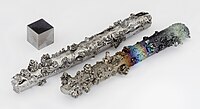
Photo from wikipedia
Abstract Site-selective deoxygenation of hydroxyl groups represents essential processes to access valuable functionalized bio-based compounds with industrial potential. One of the challenging tasks in this context is to convert biodiesel-derived… Click to show full abstract
Abstract Site-selective deoxygenation of hydroxyl groups represents essential processes to access valuable functionalized bio-based compounds with industrial potential. One of the challenging tasks in this context is to convert biodiesel-derived glycerol in the presence of abundant water directly to 1,3-propanediol (1,3-PDO), a key component of the emerging polymer industry. Herein, a monometallic iridium supported on H-ZSM-5 in the absence of Re oxophilic metal oxides was prepared via grinding-assisted impregnation procedures and attempted as an effective and recyclable catalyst for the aqueous-phase selective hydrogenolysis of glycerol toward 1,3-PDO in the absence of acid additives. The results revealed the necessity to control the Ir domain dispersions, Ir 0 /Ir 3+ ratio and the amounts of overall acid/Bronsted acid sites. Activity depended linearly on the amount of overall and Bronsted acid sites, and 1,3-PDO selectivity increased in the presence of Ir-induced Bronsted acid sites, denoted as Ir-O(H)-H-ZSM-5. We speculate that Ir-O(H)-H-ZSM-5 are generated by the interfacial synergistic interaction between IrO x and H-ZSM-5 through hydrogen spillover and reverse hydrogen spillover according to the reported literatures. The reaction mechanism to elucidate the role of Ir-O(H)-H-ZSM-5 sites in glycerol hydrogenolysis was also postulated based on extensive characterization and catalytic reaction results.
Journal Title: Journal of Catalysis
Year Published: 2019
Link to full text (if available)
Share on Social Media: Sign Up to like & get
recommendations!